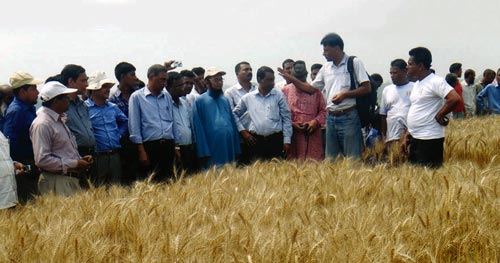CIMMYT-CSISA-Bangladesh organized a field day in collaboration with the Wheat Research Centre (WRC) and the Department of Agriculture and Extension (DAE). In all, 162 farmers from Mymensingh, Bangladesh, attended the field day, held on 21 March 2012. CSISA–BD is a collaborative venture funded by USAID that includes CIMMYT, IRRI, WorldFish, and relevant national research and development partners. Also participating in the field day were other partners who work with CSISA-BD, CIMMYT, and Mymensingh Hub, such as the Directorate of Agricultural Extension and Bangladesh Agricultural Research Institute (BARI), and NGOs, such as CARE, ASPADA, POPI, and JABC.

Although cropping intensity in the region is 212%, just one crop (black gram) is grown in the charlands of the Brahmaputra River. Charlands are formed through the sedimentation, over time, of huge amounts of sand, silt, and clay carried by rivers. Growing the preferred crop (Boro rice) in these lands is not feasible for lack of surface water.
CSISA–CIMMYT identified the charlands as a potential area for new wheat and maize hybrids, and organized demonstrations and on-farm participatory research on Ug99 tolerant wheat varieties BARI Gom 26 and BARI Gom 27 (Francolin) and hybrid maize. Farmers were happy to see both wheat and maize growing in demonstrations with limited irrigation. They said this was the first time in history that maize and wheat could be grown in charland areas with this level of success, and expressed an interest in significantly expanding the area sown to these materials next year. It has been estimated that such technologies could impact hundreds of hectares in this region and thousands of hectares across Bangladesh.
During the demonstrations, Dr. DB Pandit, cropping systems agronomist for CSISA-CIMMYT, gave an overview of CSISA-BD activities in the charlands. DAE Adjunct Director Dr. ASM Affazuddin and WRC Director Dr Jalal Uddin Ahmed spoke very highly of these efforts and assured farmers they would establish more wheat and mungbean demonstrations next year. Dr. TP Tiwari, CIMMYT-BD cropping systems agronomist, asked farmers to share the knowledge and skills they have gained so far from CSISA-BD interventions with their neighbors and relatives. He also initiated discussions on improved maize production technologies. All NGO participants expressed their determination to support the implementation of CIMMYT-CSISA activities aimed at achieving sustainable food security and improving the livelihoods of charland farmers. M. Islam, administrative coordinator of the Mymensingh Hub who led the organization of the field day, ended the program by thanking all participants.